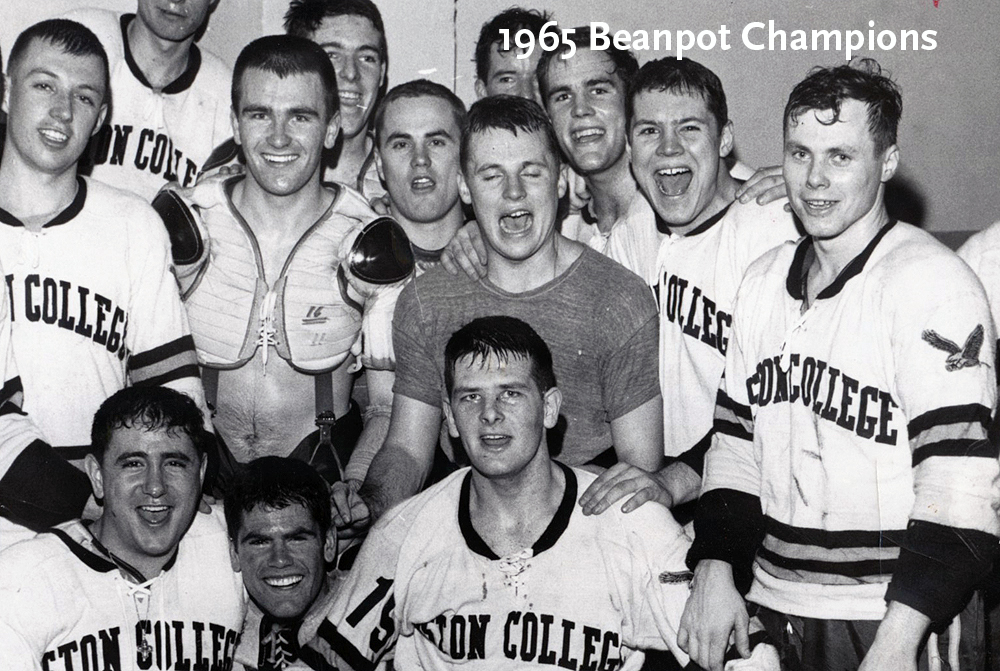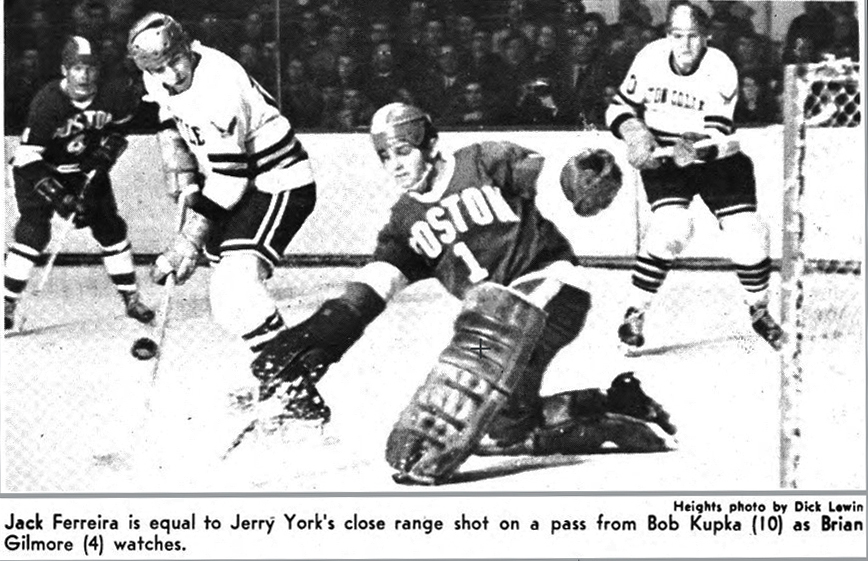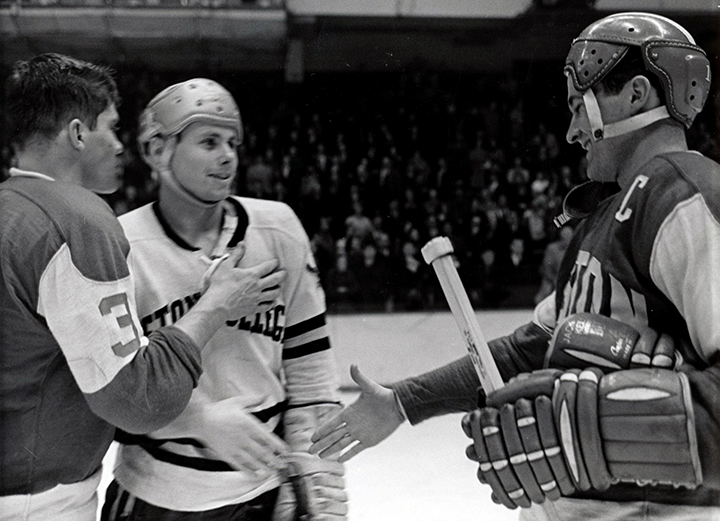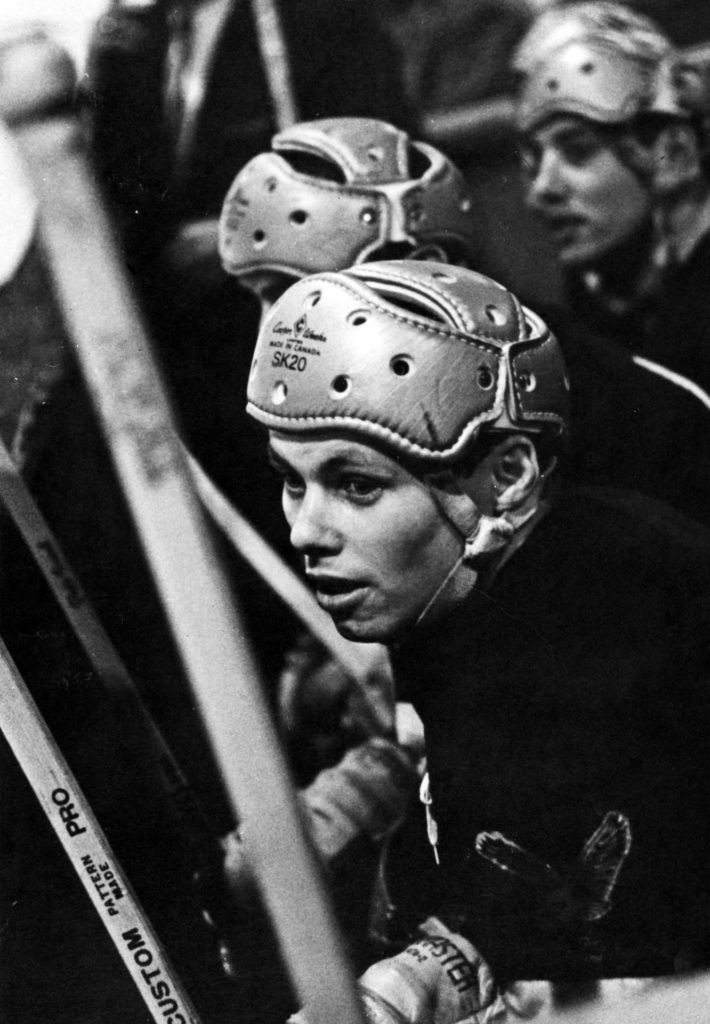On this date in 1965, the Eagles won their 3rd straight Beanpot title, beating BU 5-4. It was, however, the only Beanpot crown BC would win during our years at BC. As the Syracuse football game in 1964 was our first and best football game, our first Beanpot was also our best.
The game article in the February 19, 1965, Heights refers to the “computer” used by the Boston Traveler (!) to predict a Terrier victory. John Cunniff, the best BC hockey player of our era, was the (super?)human who led the Eagles to the win.
BC fell behind BU, 2-0, early in the 2nd period. Then, as the Boston Globe (BCBU1965) reported, BU goalie Jack Ferreira “made like Dick Stuart,” letting a shot by BC’s Bob Kupka bounce off his glove into the net. BC tied the score less than a minute later on an assist from Cunniff. Later in the period, Cunniff scored a short-handed goal. The teams entered the 3rd period tied at 3 goals each.
In the 3rd, Cunniff deflected a shot from Jim Mullen past the BU goalie. Less than 2 minutes later, BC’s John Moylan stole the puck at the BU blue line and sent a slap shot into the net for what would prove to be the game-winner.
BC goalie Pat Murphy was superb, making 42 saves, 19 in the final period.
A column by the Globe‘s Bud Collins (BudCollins_Cunniff) described what he termed the “madness” of the Beanpot. “The hypertensive roar when Bob Kupka started the Eagles’ scoring in the second period would have shattered windows in the Soviet embassy in Washington if the wind had been right.” Leading “madman, according to Collins, was Cunniff. “It is ever dangerous for Cunniff to make his people so insanely happy.”
Cunniff was named MVP of the 1965 Beanpot, repeating his 1964 MVP award and becoming the first player to be named MVP in successive years. It was 39 years before that feat was repeated.
Former Heights sports editor, sports information director at BC for 23 years, BC administrator for 41 years, BC sports historian, and classmate Reid Oslin recently wrote this appreciation of John Cunniff:
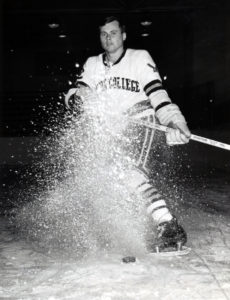 “No one worked harder in Coach John ‘Snooks’ Kelley’s exhausting practices than John Cunniff, a young man who grew up in a poor family living in a three-decker home on East 2nd Street of South Boston. ‘You never had to motivate John,’ said his brother Ted of the two-time collegiate All-America player who was BC’s all-time leading scorer (151 points in 75 games) in his 3-year varsity career (1963-66) and later became an Olympian, professional player, and NHL head coach.
“No one worked harder in Coach John ‘Snooks’ Kelley’s exhausting practices than John Cunniff, a young man who grew up in a poor family living in a three-decker home on East 2nd Street of South Boston. ‘You never had to motivate John,’ said his brother Ted of the two-time collegiate All-America player who was BC’s all-time leading scorer (151 points in 75 games) in his 3-year varsity career (1963-66) and later became an Olympian, professional player, and NHL head coach.
“As a youngster, Cunniff never had the advantage of playing organized hockey, but would never pass up the opportunity to improve his skills by playing in the one of the frequent pick-up games going on in Southie’s playground rinks.
“Cunniff, whose family could not afford skates until he was a teenager, worked tirelessly with ankle weights and body weights and even practiced shooting a weighted puck to build up his endurance and skill. His mother insisted that he go to Boston’s Don Bosco Trade School to learn a work skill, but when he realized that he might have a future in college hockey, Cunniff took a post-graduate year at New Prep in Cambridge, a school that not only sharpened students’ academic skills, but produced dozens of Division I hockey players. He came to BC without benefit of a hockey scholarship, but that situation did not last long when Kelley realized the immense skills and work ethic of his new recruit.
“Cunniff was assigned to a line with crafty center Phil Dyer of Melrose and Rhode Island product Jim Mullen, another goal-scoring sniper. The trio became known as the ‘Production Line’ for their steady offensive output, but Cunniff was the definite leader.
“’He could change speeds like no one else,’ said linemate Mullen. ‘If he saw an opening, no one could catch him.’
“Cunniff was especially impressive in the Beanpot Tournament spotlight. The Eagles won rare back-to-back championships in 1964 and 1965 as the quiet man from Southie tallied 4 goals and 9 points in the two tournaments.
“Following the 1964-65 regular season, the Eagles advanced to the ECAC championship with consecutive playoff victories over Dartmouth, Clarkson, and Brown. The championship earned BC a slot in the NCAA Championship playoffs held at the new Meehan Arena at Brown. ‘I was the only non-Massachusetts kid on the team,’ recalled Mullen, who was from nearby Warwick, R.I. ‘When I came to BC, I had dreams of playing for a national championship in Minnesota or Denver. Where did I get to go? The city where I was born.’
“With the powerful scoring line of Cunniff-Dyer-Mullen, the top-scoring line in all of college hockey that year, and some acrobatic goaltending by Pat Murphy, a superb athlete from Wellesley, Mass., the Eagles were ready for the semifinal game against North Dakota. The star of BC’s 4-3 victory that night, however, was a young sophomore center who not only showed a nice scoring touch on his two goals, but the leadership skills that would eventually carry him to an even loftier place in the college hockey profession: Jerry York.
“In the championship game played on March 20, the Eagles were stonewalled by Michigan Tech, 8-2, a team lead by their talented goaltender, future Chicago Blackhawk and Hockey Hall of Famer Tony Esposito.
“As a senior, Cunniff was sidelined when blindsided by a vicious hit from Brown’s rugged forward Dennis Macks. The collision separated Cunniff’s shoulder and put him on the bench for eight games –and nearly ignited a riot in the packed McHugh Forum that night, as Eagle hockey fans were horrified at the mayhem inflicted on their star player by the rough-and-tumble Macks.
“Cunniff continued his impressive hockey accomplishments long after graduating from the Heights. He was a member of the 1968 U.S. Olympic Team that competed in Grenoble, France, and later played professional hockey for the WHA’s New England Whalers. A great student of the game as well, he twice assisted Herb Brooks on the Team USA coaching staff (in 1998 and 2002) and was head coach of the New Jersey Devils from 1989 to 1991. He died from cancer at age 57 in 2002. He was inducted into the US Hockey Hall of Fame in 2003. His Boston College sweater is retired and hangs in a place of honor in the Conte Forum rafters.”
Oslin is also the author of three books on Boston College football and co-author (with Tom Burke) of another on the history of Boston College hockey.

